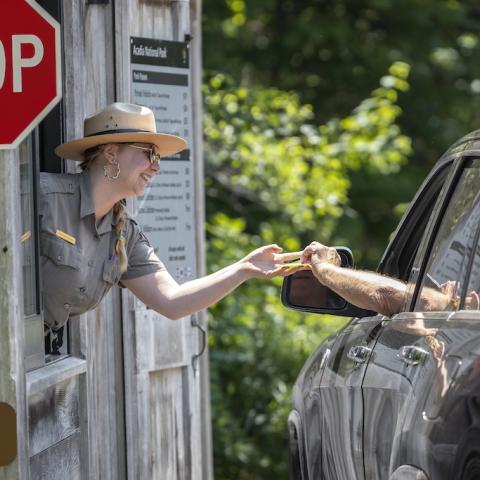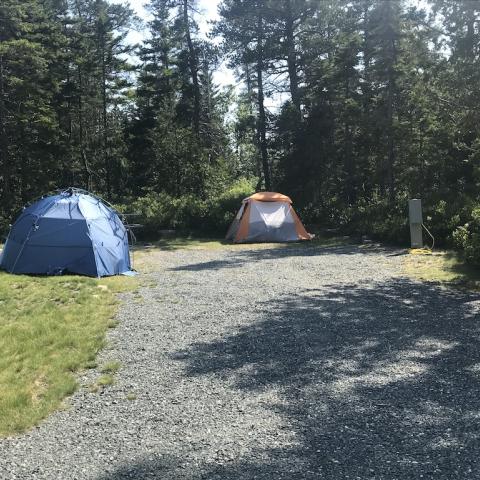
Dancing loons after preening/Kirby Adams
With spring migration over and fall shorebird migration a couple weeks away, this is the lazy part of the birding year. It’s time to float placidly on a northern lake and listen to the loons. Everyone from Henry David Thoreau to Aldo Leopold has tried to describe the song of the loon, all failing miserably compared to the experience of actually hearing it on a foggy dawn.
Observing loons during nesting season is tricky business. They don’t tolerate human disturbance and clumsy attempts to get close to them will inevitably stress and exhaust the birds. The best bet is to find a vantage point on shore and use scopes, long lenses, and binoculars for viewing. But sometimes you’ll find yourself in a boat, when doing things appropriately might get you a peaceful and rewarding interaction with the birds.
What you shouldn’t do is what Mr. Thoreau did. In Walden he writes of chasing a loon around the lake, forcing it to dive and then trying to guess where it would resurface. Eventually Thoreau decided it was best to “rest on my oars and wait his reappearance.”
Not a bad idea. If you’re low in the water and not making any arm flapping motions (i.e. rowing), loons are generally not inclined to dive or scurry off. I was canoeing on Long Pond in Acadia National Park several years ago and decided to not do the Thoreau method, but rather float and see what happened as I passed by a loon. It went under as I approached, but reappeared just a few yards astern. It repeated that process several times, checking out my canoe from every angle, more curious than alarmed.

A nesting loon at Acadia National Park/Kirby Adams
Nesting loons are very easy to disturb, sometimes inadvertently. I had that near misfortune, again in Acadia, when I slipped through a mosquito-filled line of brush to get a look at a remote pond. As soon as I parted the last branches, there was a loon resting on a tussock nest right in front of me. She gave me a dirty look which I returned with a silent apology. I didn’t want to startle the bird, so I diverted my eyes and backed up slowly. I managed to snap a photo from a concealed spot before going about my business and leaving her to her far more important duties.
Loons on the water with chicks show some interesting behaviors. Gulls and eagles are the sworn enemies of parental loons. If eagles are in the air, as they often are on loon lakes, the loon parents will give repeated alarm calls and shelter their chicks which are not adept at diving for cover.
I recently spent a morning on the water with wildlife photographer Charles “Chas” Glatzer discussing loons. When a loon family approached our stationary pontoon and fed their chick six feet off the boat rail, Chas recounted a time when he was put on babysitting duty. Eagles had taken to the air, and the loon pair herded their babies to the shelter of the pontoon before retreating to give alarm calls and monitor the eagles.

Taking care of the kids/Kirby Adams
Chas wanted to get his photography workshop participants on to another location, but felt compelled to stay since he’d essentially been charged with shielding the loons. That’s a fine example of what happens when you approach loons – or any bird – by not approaching them. Let the animals come to you and before you know it, you’ll be part of the story, but a passive and unobtrusive part.
The best summer loon lakes in the national parks are in Acadia. As mentioned above, any peaceful pond or lake of an acre or more on Mount Desert Island is likely to have at least one pair of loons. Voyageurs National Park is another excellent looning location, with arguably the best paddling in the NPS system. Yellowstone National Park and the northern national lakeshores also provide good summer loon habitat.
Grab some paddles and head out to see if you can spot a family of loons. Just remember that you’re in their house and mind your manners. Eventually Thoreau got that hint himself, wrapping up his loon chase the most satisfying way:
“At length having come up fifty rods off, he uttered one of those prolonged howls, as if calling on the god of loons to aid him, and immediately there came a wind from the east and rippled the surface, and filled the whole air with misty rain, and I was impressed as if it were the prayer of the loon answered, and his god was angry with me; and so I left him disappearing far away on the tumultuous surface.”
Well played, Henry.
Traveler footnote: Traveler Editor Kurt Repanshek was severely taunted by loons during a canoe trip to Yellowstone. You can read about it here.




 Support Essential Coverage of Essential Places
Support Essential Coverage of Essential Places







Add comment